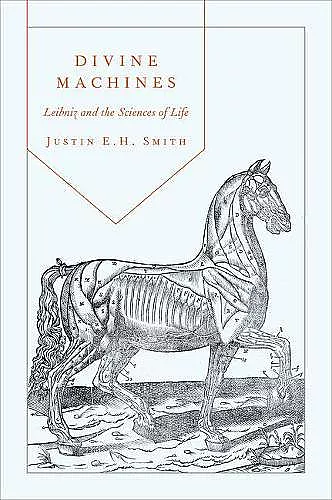Divine Machines
Leibniz and the Sciences of Life
Format:Hardback
Publisher:Princeton University Press
Published:13th May '11
Currently unavailable, and unfortunately no date known when it will be back

Though it did not yet exist as a discrete field of scientific inquiry, biology was at the heart of many of the most important debates in seventeenth-century philosophy. Nowhere is this more apparent than in the work of G. W. Leibniz. In Divine Machines, Justin Smith offers the first in-depth examination of Leibniz's deep and complex engagement with the empirical life sciences of his day, in areas as diverse as medicine, physiology, taxonomy, generation theory, and paleontology. He shows how these wide-ranging pursuits were not only central to Leibniz's philosophical interests, but often provided the insights that led to some of his best-known philosophical doctrines. Presenting the clearest picture yet of the scope of Leibniz's theoretical interest in the life sciences, Divine Machines takes seriously the philosopher's own repeated claims that the world must be understood in fundamentally biological terms. Here Smith reveals a thinker who was immersed in the sciences of life, and looked to the living world for answers to vexing metaphysical problems. He casts Leibniz's philosophy in an entirely new light, demonstrating how it radically departed from the prevailing models of mechanical philosophy and had an enduring influence on the history and development of the life sciences. Along the way, Smith provides a fascinating glimpse into early modern debates about the nature and origins of organic life, and into how philosophers such as Leibniz engaged with the scientific dilemmas of their era.
"Smith thus offers a broader historical context than the title suggests. But with Divine Machines, Leibniz himself emerges as a fascinating example of the early modern obsession with the grand questions about life, and is for this reason certainly of interest to historians of science and medicine."--Stephanie Eichberg, British Journal for the History of Science "Smith's ... book affords quite a number of innovative analyses and is due to become a landmark of Leibniz studies."--Francois Duchesneau, HOPOS: Journal of the International Society for the History of Philosophy of Science "Even in the instances where the reader's doubts linger, Smith's scholarship makes a convincing case and one is required to look anew at Leibniz's most well known commitments. For the contributions it makes in our understandings of Leibniz and for the way in which Leibniz is integrated in the emergence of the life sciences, Divine Machines is highly recommended reading."--Lea F. Schweitz, Aestimatio
ISBN: 9780691141787
Dimensions: unknown
Weight: 680g
392 pages